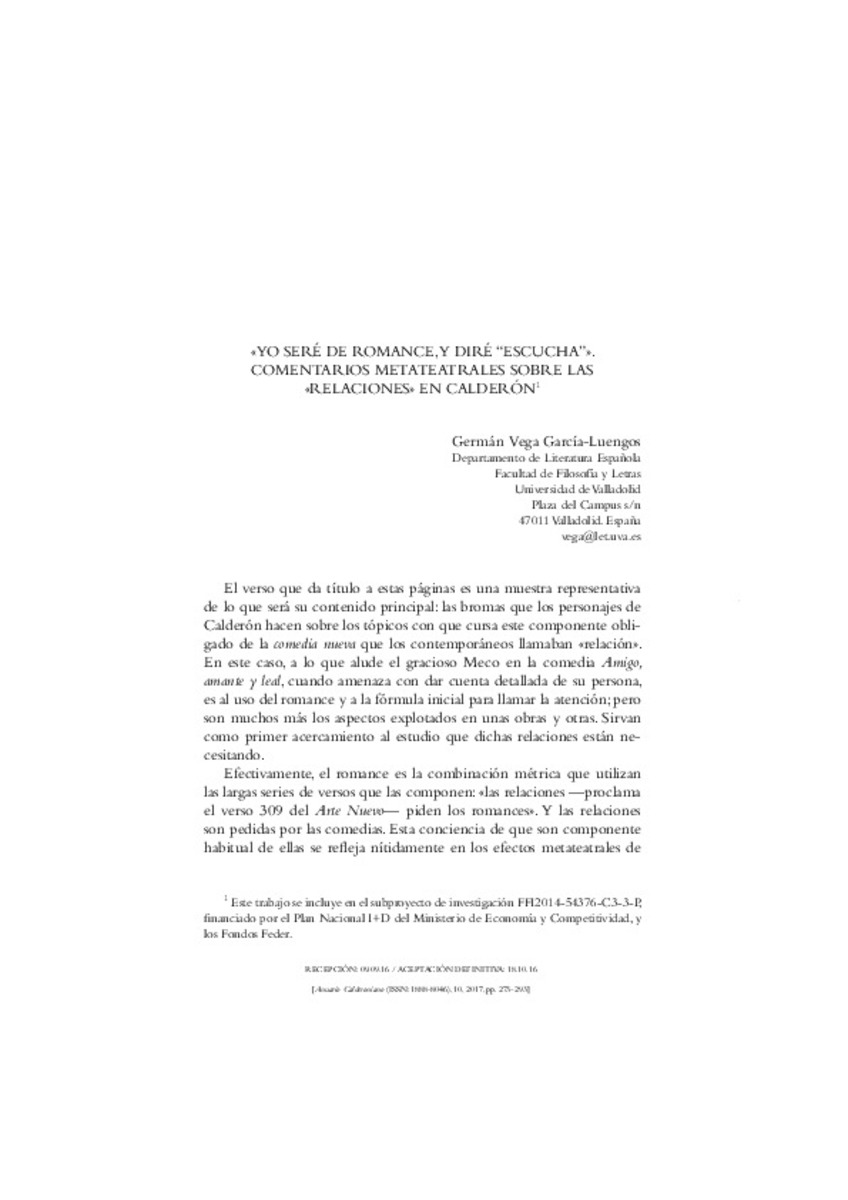Full metadata record
| DC Field | Value | Language |
|---|---|---|
| dc.creator | Vega-García-Luengos, G. (Germán) | - |
| dc.date.accessioned | 2019-07-02T07:54:39Z | - |
| dc.date.available | 2019-07-02T07:54:39Z | - |
| dc.date.issued | 2017 | - |
| dc.identifier.citation | Vega García-Luengos, Germán, «“Yo seré de romance y diré ‘escucha’”. Comentarios metateatrales sobre las “relaciones” en Calderón», Anuario Calderoniano, 10, 2017, pp. 273-293. | es_ES |
| dc.identifier.issn | 1888-8046 | - |
| dc.identifier.uri | https://hdl.handle.net/10171/57903 | - |
| dc.description.abstract | Rara es la comedia que carece de una o más tiradas largas en romance que los contemporáneos llamaban «relaciones». La gestión de la información que debe suministrarse a los otros personajes y al público para seguir la acción es una de sus funciones principales; pero sin duda hay otras razones ajenas a la trama que explican su existencia, y que van desde la celebración de determinados acontecimientos de la vida real al lucimiento de las capacidades recitativas de los representantes o el placer de oír recitar versos que experimentaban las gentes de aquel tiempo. Su uso generó abundantes tópicos, que son desvelados por los propios personajes mediante comentarios metateatrales. El conjunto de los localizados en las comedias calderonianas se ha organizado por su referencia a distintos factores: emisor, receptor, contexto, contenido (temas y motivos), forma y conexiones extrateatrales. El trabajo pretende así acercarse a la idea que los propios agentes del teatro del Siglo de Oro tenían sobre las relaciones y conocer algo más sobre los recursos cómicos de Calderón. | es_ES |
| dc.description.abstract | A comedy without long runs in «romance» like «relaciones», name used by contemporary people, would have been hard to find. The management of the information which has to be provided to the other characters and to the audience is one of its main functions; but without doubt there are many other reasons apart from the plot that explain its being, ranging from the celebration of certain events of real life to the brilliance of the recitative capacity of the actors, or the audiences’ pleasure of listening to recitations of verses. Its use generated abundant topics, which were revealed by the characters themselves through-out metatheatrical commentaries. The set of «relaciones» found in Calderón’s comedies have been organised depending on their referencing to different factors: transmitter, receiver, context, content (themes and motifs), form and extratheatrical relations. The aim of this work is to facilitate an approach to the concept that the agents of Golden Age theatre had about «relaciones» and to gain further insights into Calderón’s comic resources. | es_ES |
| dc.language.iso | spa | es_ES |
| dc.publisher | Iberoamericana/Vervuert | es_ES |
| dc.rights | info:eu-repo/semantics/openAccess | es_ES |
| dc.subject | Materias Investigacion::Filología y Literatura | es_ES |
| dc.subject | Calderón de la Barca | es_ES |
| dc.subject | Relación | es_ES |
| dc.subject | Humor | es_ES |
| dc.subject | Metateatro | es_ES |
| dc.subject | Humour | es_ES |
| dc.subject | Metatheatre | es_ES |
| dc.title | “Yo seré de romance y diré ‘escucha’”. Comentarios metateatrales sobre las “relaciones” en Calderón | es_ES |
| dc.type | info:eu-repo/semantics/article | es_ES |
| dadun.citation.endingPage | 293 | es_ES |
| dadun.citation.startingPage | 273 | es_ES |
| dadun.citation.volume | 10 | es_ES |
Files in This Item:
Statistics and impact
Items in Dadun are protected by copyright, with all rights reserved, unless otherwise indicated.






